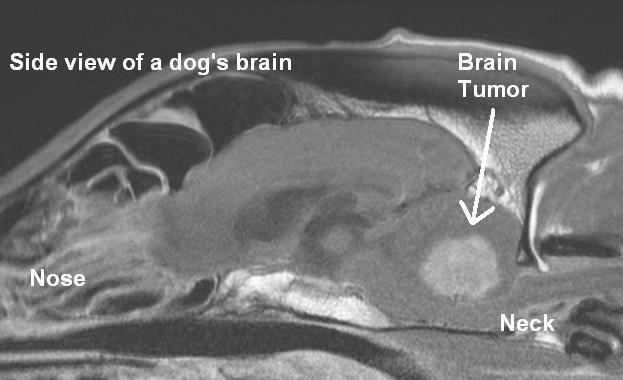Understanding and Successfully Treating Brain Tumors (Intracranial Neoplasia) in Dogs
Brain tumors in dogs are one of the most serious types of canine cancer. Often, the high expense of treatment, combined with poor chance at remission, leads to an unfortunately short survival time.
There are different types of cancerous tumors as well as different location in the cranium that are also factor into the severity.
 Dogs with longer noses tend to have higher predisposition towards Meningioma (a lining around the brain), and shorter nosed dogs to gliomas.
Dogs with longer noses tend to have higher predisposition towards Meningioma (a lining around the brain), and shorter nosed dogs to gliomas.
Primary brain tumors originate from cells within the brain and its surrounding membranes. While a secondary brain tumor, has spread to the brain from elsewhere (metastasis).
The main types of primary brain tumors that originate in the dog’s brain include meningioma, glioma, choroid plexus papilloma, pituitary adenoma and adenocarcinoma.
Meningioma – This is the most common primary brain tumor in dogs and arises from the the membranes that line the brain, rather than the actual cells of the brain itself. So, they’re not actually brain tumors, but tend to be grouped with them due to their location and effect on the brain.
Meningiomas are typically slower growing and more treatable than other types of brain tumors in dogs.
These types of tumors tend to be more common in long nosed dogs such as Collies.
Secondary brain tumors
Secondary tumors are considered more serious and have a poor prognosis due to the fact that have spread to the brain from elsewhere in the body, suggesting additional cancer elsewhere.
 Cases of brain tumors have been on the rise in young dogs of certain breeds, such as Boston terriers and Boxers.
Cases of brain tumors have been on the rise in young dogs of certain breeds, such as Boston terriers and Boxers.
Main Causes for Brain Tumors in Dogs
There’s been a rise in many types of cancer in dogs in recent decades and it’s suspected that a variety of factors are involved in challenging the immune system, such as improper diet and exposure to herbicides and pesticides.
Diagnosis
A complete physical and neurological exam with a blood test will need to be performed in order identify any signs that point to problems in the brain.
A (CT) or (MRI) will be necessary in order to accurately image the brain and detect the size and location of a mass. (CT) scan are generally less expensive, however they can have difficulty detecting Gliomas and as well as imaging the brainstem and cerebellum.
Once a mass is detected a sample of the tumor is then needed to properly identify it as a type of brain cancer.
Prognosis
Unfortunately, the prognosis for most brain tumors is a a few months even with treatments. The primary goal of treatment is simply to extend the quality of life.
If the complete surgical removal of the tumor is possible, then there’s a chance at remission, but this is extremely rare, and thus not considered a likely outcome.
Unfortunately, there’s not much data on canine brain tumors at this point, mainly due to fact that most dog owners don’t have the thorough testing done, due to the cost and probable outcome.
Canine Brain Tumor Symptoms
- Seizures
- Increased aggression
- Hypersensitivity to neck area
- Constant pacing or circling
- Vision problems
- Lethergy
- Decreased awareness
- Ability to walk
- Abnormal pupil size
- Leaning/falling to the side of a head tilt

Brain tumors cause signs by compressing or invading a part of the brain. The resulting signs relate directly to that area of the brain.
The tumors in the Forebrain, Brainstem and Vestibular can show some different as well as overlapping symptoms.

Conventional Treatments for Brain Tumors in Dogs
Conventional treatments for canine brain tumors consist mainly of surgery, radiation and chemotherapy. Unfortunately, complete surgical removal is difficult, due to the fact that there’s very limited space to operate within the cranium, combined with the inability to remove surrounding brain tissue without causing adverse mental effects.
Meningiomas are more often located in a membrane on the surface of the brain making them a better candidate for surgical removal. to be located on the surface of the brain and are therefore the best candidates for surgical removal. Gliomas on the other hand, most often lye deep within the substance of the brain, making them more difficult to remove.
Surgery may be used in conjunction with radiation to partially remove the tumor, and then attempt to shrink them and or reduce the chance of regrowth following surgery. Radiation has been shown to slow the growth of most types of brain tumors, however the dog must be considered healthy enough to administer a large enough treatment to be effective.
Chemotherapy has a limited effectiveness do to a blood brain barrier (BBB) and therefore is not a common treatment for this type of cancer. However there is a new drug called temozolomide, that has been effective in some humans and may offer similar outcome in canines though there is no data on this yet.
At this point, conventional treatments alone offer little hope of attaining remission but often simply aim at relieving symptoms and extending the quality and quantity of life a bit longer.
Holistic Treatments for Brain Tumors in Dogs
Though most conventional treatments for brain tumors in dogs offer little long term hope, that doesn’t mean that remission isn’t possible. There are cases of long survival rates as well as remission, however to achieve this, diet and a full spectrum approach are crucial.
When it comes to treating a dog for an illness, it’s important to keep in mind the idea of assisting the body restore itself to health. The body has the amazing ability to heal itself, and for most illnesses it’s incredibly successful. When a serious and fatal illness such as cancer develops, there’s often the aspect of a immune system dysfunction that contributes to the issue.
The digestive tract is directly connected to the immune system and often plays a vital role in contracting an illness as well as recovering from it. This is why the proper diet is so important, as without it, the underlying cause is not addressed and the immune system’s healing power is not being fully utilized..
Even with conventional medicine and surgery, it’s the body that still needs to do the work of recovery, and assisting that process is surest way to assure the best results. Constructing a diet to support the digestive tract and holistic treatments such as powerful herbs and supplements to boost the immune system functions are vital and increase the chance of restoring health drastically.
Brain cancer in dogs is a seriously fatal disease that has risen over resent years, most likely by external factors such as diet and chemical exposure. With that in mind, to have the highest chance at restoring health, these external factors need to be removed and replaced with health boosting supplementation.
Each case of dog cancer is different and needs to be assessed and addressed independently. The type of cancer, the organs affected, and the unique circumstances of each dog will determine what the best options are. If conventional treatment are involved, then those have to be considered as to not conflict and cause complications. For that reason, there’s no “one” treatment that is best for all circumstances and some amount of consideration for all the different aspects is needed.
Is it a Case of Faulty Genes?
In the vast majority of cases, absolutely not. Some types of cancer are more common it certain breeds as we see with brain tumors. They may in fact be more predisposed, but it’s important to understand that predisposed does not mean predetermined! Genetics are a factor, but there are many other factors as well.
For cancer, or any disease to develop, a dysfunction in the immune system must be present. So by addressing this area, we can greatly reduce illnesses regardless of what genetic challenges a certain breed has.
All that being said, when a breed is more predisposed, this simply means that when something is challenging the immune system, this is generally the weakest link and where we often find the effects first.
Many dogs have these same “weak links” and go on to live a healthy and full full lives, while some unfortunately do not. Genes are merely blueprints, and it’s how well these these blueprints are properly built upon and maintained that makes the difference.
External factors such as dietary complications and toxins are a main factor in affecting the digestive tract and immune system, which are directly linked. This intern allows for the cells (the blueprint) to be altered and cancer to develop.




